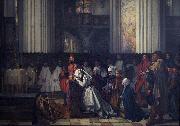Großhandels China Öl Gemälde & Rahmt Ein |
|||||||||||

|
|||||||||||
|
|
|
||||||||||||||
|
Henri Leys
(18 February 1815 - 26 August 1869), also known as Henri Leys, was a Belgian painter and printmaker. Henri Leys was born and died in Antwerp. He studied with Mathieu Ignace Van Bree (1773-1839) at the Koninklijke Academie voor Schone Kunsten in Antwerp and then with his brother-in-law Ferdinand De Braekeleer (1792-1883). At the start of his career, he worked with the Belgian Romantic painter Egide Charles Gustave Wappers (1803-1874). Both artists were interested in nationalistic subjects painted in styles that owe much to the example of 16th- and 17th-century Flemish painting. In 1835 Leys went to Paris where he visited the studio of Eugene Delacroix and met Paul Delaroche. During the 1840s, Leys began painting scenes set in 16th-century Antwerp, combining details studied from life with a deliberately archaizing style reminiscent of 16th-century German painters like Albrecht Derer and Quinten Matsys. Some of the pictures have specific historical subjects, but others are genre scenes. With these pictures, he earned a following among many younger artists in Belgium as well as a considerable reputation in France, where he won a gold medal at the International Exhibition in Paris in 1855 for his historical painting The Mass of Berthal de Haze (Royal Museum of Fine Arts, Brussels). In 1862 Leys was created a baron by King Leopold I. At the time of his death, he was engaged in decorating the interior of the Antwerp Town Hall with monumental frescoes depicting the city's history (1863-9). There are easel replicas of these in Brussels. Among the artists who studied with him are James Tissot and Sir Lawrence Alma-Tadema. His best-known pupil is his nephew Henri De Braekeleer (1840-1888). |
||||||||||||||
|
|
||||||||||||||
|
||||||||||||||
|
|
||||||||||||||
| Henri Leys
(18 February 1815 - 26 August 1869), also known as Henri Leys, was a Belgian painter and printmaker. Henri Leys was born and died in Antwerp. He studied with Mathieu Ignace Van Bree (1773-1839) at the Koninklijke Academie voor Schone Kunsten in Antwerp and then with his brother-in-law Ferdinand De Braekeleer (1792-1883). At the start of his career, he worked with the Belgian Romantic painter Egide Charles Gustave Wappers (1803-1874). Both artists were interested in nationalistic subjects painted in styles that owe much to the example of 16th- and 17th-century Flemish painting. In 1835 Leys went to Paris where he visited the studio of Eugene Delacroix and met Paul Delaroche. During the 1840s, Leys began painting scenes set in 16th-century Antwerp, combining details studied from life with a deliberately archaizing style reminiscent of 16th-century German painters like Albrecht Derer and Quinten Matsys. Some of the pictures have specific historical subjects, but others are genre scenes. With these pictures, he earned a following among many younger artists in Belgium as well as a considerable reputation in France, where he won a gold medal at the International Exhibition in Paris in 1855 for his historical painting The Mass of Berthal de Haze (Royal Museum of Fine Arts, Brussels). In 1862 Leys was created a baron by King Leopold I. At the time of his death, he was engaged in decorating the interior of the Antwerp Town Hall with monumental frescoes depicting the city's history (1863-9). There are easel replicas of these in Brussels. Among the artists who studied with him are James Tissot and Sir Lawrence Alma-Tadema. His best-known pupil is his nephew Henri De Braekeleer (1840-1888). 1854 |
||||||||||||||
|
Related Paintings to Henri Leys :. |
||||||||||||||
|
|
||||||||||||||
|
|
||||||||||||||
|
KONTAKTIEREN Sie UNS |







